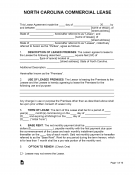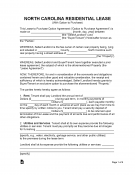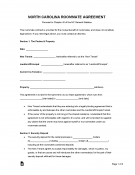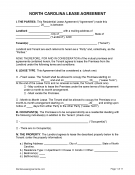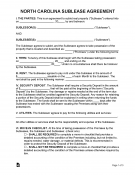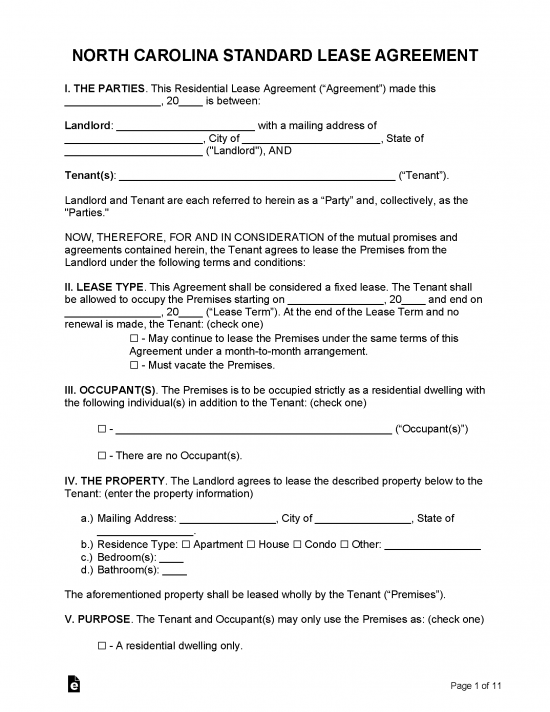North Carolina lease agreements bind landlords and tenants to the terms of a lease of property. The agreement will typically contain the monthly rent, responsibility for utilities, and other items that the parties want to specify, such as a policy on pets. Both parties should think of the lease agreement as the first resource to clarify their obligations under the lease.
Contents
By Type (6)
- Commercial Lease Agreement
- Month-to-Month Lease Agreement
- Rent-to-Own Lease Agreement
- Roommate Lease Agreement
- Standard Lease Agreement
- Sublease Agreement
Download: Adobe PDF, MS Word, Rich Text Format
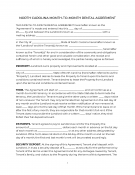 Month-to-Month Lease Agreement
Month-to-Month Lease Agreement
Download: Adobe PDF, MS Word, Rich Text Format
Download: Adobe PDF, MS Word, Rich Text Format
Download: Adobe PDF, MS Word, Rich Text Format
Download: Adobe PDF, MS Word, Rich Text Format
Download: Adobe PDF, MS Word, Rich Text Format
Landlord-Tenant Laws
Statutes – Chapter 42 (Landlord and Tenant)
Required Disclosures (2)
Lead-Based Paint Disclosure – Federal law mandates that landlords leasing properties with dwelling units built before 1978 inform tenants of the dangers associated with lead-based paints.
Security Deposit Receipt – If a landlord requires a security deposit from a tenant, the deposit must be kept in an interest-bearing account in an institution located in North Carolina. The landlord may keep the deposit in an institution outside the state only if the landlord also provides the tenant with a bond sufficient to cover the deposit, arranged with an insurance company licensed to do business in North Carolina. The landlord must inform the tenant of the name and address of the banking institution or bonding company within thirty (30) days of the beginning of the lease. (§ 42-50)
Security Deposit Laws
Maximum Amount ($)
Landlords may charge no more than two (2) month’s rent as a security deposit. (§42-51)
Returning to Tenant
In most circumstances, landlords must return a tenant’s security deposit within thirty (30) days of the termination of the lease agreement. Landlords may retain a portion of the security deposit to pay for unpaid rent or unpaid fees that are named in the lease agreement, repairs of damage to the dwelling unit (other than those caused by wear and tear), remedying violations of the lease agreement, and court costs associated with proceedings against the tenant in which the landlord prevails.
The landlord must identify all deductions in a written itemization delivered to the tenant along with any remaining funds. If the accounting of the amount retained will take longer than thirty days, the landlord may provide an interim accounting within thirty (30) days, and a final accounting within sixty (60) days. If the tenant is unaware of the tenant’s new address following the termination of the lease, the landlord must keep the written itemization and remaining funds for the tenant for at least six (6) months after the termination of the lease. (§42-52)
When is Rent Due? (grace period)
Landlords and tenants may agree on a date on which rent is due in the lease agreement, but landlords may not begin collecting late fees until rent is at least five (5) days late. (§42-46)
Eviction Notice (non-payment)
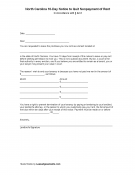 10-Day Notice to Pay or Quit – If a tenant fails to pay rent on the day it is due, the landlord may inform the tenant that the lease may be terminated if the tenant fails to pay rent within the ensuing ten (10) days. The landlord or an agent should deliver this notice to the tenant or leave it in a conspicuous place on the property. (§42-3)
10-Day Notice to Pay or Quit – If a tenant fails to pay rent on the day it is due, the landlord may inform the tenant that the lease may be terminated if the tenant fails to pay rent within the ensuing ten (10) days. The landlord or an agent should deliver this notice to the tenant or leave it in a conspicuous place on the property. (§42-3)
Download: Adobe PDF
Maximum Fees ($)
Late Rent Penalties
For monthly residential lease agreements, landlords may charge a late fee of no more than the greater of $15 or five percent (5%) of the monthly rent. (§42-46)
NSF Checks
Landlords, like other parties accepting checks in the state, may charge a fee of no more than $35 upon receiving a check refused by a bank because the tenant’s account did not have sufficient funds. (§25-3-506)
Tenant’s Unclaimed Property
If a tenant’s personal property is left behind following an eviction, the landlord must allow the sheriff to remove the property and take it to a storage facility. In this case, the sheriff may seek payment for the cost of storage from the landlord in advance; if the landlord declines, the sheriff will not carry out the eviction. The landlord may later seek reimbursement from the tenant for the storage cost. The landlord must notify the tenant of the storage of the property in writing, and if the tenant fails to respond within seven (7) days, then the landlord may dispose of the property as he or she sees fit (§42-36.2).
If the property left behind is worth less than $750, the landlord may alternatively arrange for the property to be taken to a charitable organization that will agree to hold it for thirty (30) days, and provide written notice to the tenant of this arrangement. If the tenant fails to claim it in that time period, the property will pass to the organization. This option is also available for personal property that the landlord reasonably believes has been abandoned. (§42-25.9)
